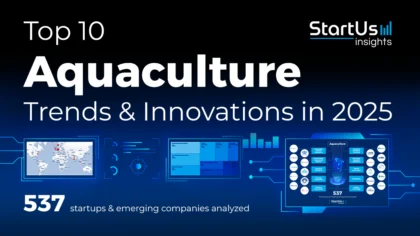Accelerate Productivity in 2025
Reignite Growth Despite the Global Slowdown
Staying ahead of the technology curve means strengthening your competitive advantage. That is why we give you data-driven innovation insights into the agriculture industry. This time, you get to discover 5 hand-picked zero-emission farming solutions.
Out of 346, the Global Startup Heat Map highlights 5 Top Zero-Emission Farming Solutions
The insights of this data-driven analysis are derived from the Big Data & Artificial Intelligence-powered StartUs Insights Discovery Platform, covering 2 093 000+ startups & scaleups globally. The platform gives you an exhaustive overview of emerging technologies & relevant startups within a specific field in just a few clicks.
The Global Startup Heat Map below reveals the distribution of the 346 exemplary startups & scaleups we analyzed for this research. Further, it highlights 5 AgriTech startups that we hand-picked based on criteria such as founding year, location, funding raised, and more. You get to explore the solutions of these 5 startups & scaleups in this report. For insights on the other 341 zero-emission farming solutions, get in touch.
Spowdi enables Irrigation Optimization
With the advent of novel AgriTech technologies, the industry optimizes the ratio of land use to crop yield. However, inefficient usage of irrigation systems and agriculture machinery increases emissions. Thus, sub-optimal farming practices are unsustainable and contribute to greenhouse gas (GHG) emissions. To solve this challenge, startups develop solutions that optimize land and water usage to promote zero-emission farming.
British startup Spowdi provides an agricultural water optimization solution. Spowdi Mobile Pro, the startup’s product, delivers the right amount of water directly to the plant at the right time, thereby improving yield. The solution runs on solar power and delivers up to 1 500 liters of water per hour with high and stable pressure. Through the startup’s technology, farmers save both water and energy bills.
Refarmed facilitates Sustainable Farming
The use of pesticides in farming leads to secondary GHG emissions. Moreover, climate change itself increases insect populations by increasing the rates of their metabolism and reproduction. To prevent this, startups offer sustainable farming solutions that do not rely on synthetic chemicals. Furthermore, these solutions optimize water usage to save resources while increasing yields.
Danish startup Refarmed enables sustainable farming with decentralized and zero-emission practices. The startup utilizes green technologies and concepts of the circular economy which transforms farms into tech-enabled smart farms. Further, it integrates gardens into buildings and enables regenerative ecosystems. Thereby, Refarmed allows businesses and farms to optimize the use of land and resources.
Locus Agricultural Solutions develops Probiotic Soil Supplements
In the current paradigm, farming leads to both carbon dioxide and nitrous oxide emissions. The strengthening of roots allows plants to capture greenhouse gases present in the atmosphere. Therefore, startups provide soil supplements that improve root nutrition, for example, supplements that facilitate carbon capture and sequestration.
US-based startup Locus Agricultural Solutions offers probiotic soil supplements. Their products allow farmers to improve yields while reducing nitrous oxide emissions. Additionally, the product enables carbon sequestration, thereby reducing atmospheric carbon dioxide levels. It also improves the soil microbiome and increases the root mass that assists in reducing GHG emissions.
Cellestial eMobility designs Fully Electric Tractors
Agricultural vehicles, like most vehicles, use fossil fuels and emit GHG emissions. However, the use of these vehicles is necessary for optimizing agricultural tasks such as plowing, tilling, disking, harrowing, and planting. Besides, they reduce time expenditure and dependence on manual labor. Therefore, startups develop zero-emissions agricultural vehicles. For example, electric tractors do not contribute to GHG production while helping cultivators meet their requirements.
Indian startup Cellestial E-Mobility builds electric tractors with drive-by-wire technology. The tractors replace steering columns and universal guide rods with a wireless steering system. An electric braking system avoids mechanical friction between the brake shoe and contacting face. The startup’s tractor is a sustainable alternative to traditional tractors.
Bio Natural Solutions offers Organic Shelf-Life Extension Products
Reducing food waste is necessary to increase sustainability. Spoiled produce leads to secondary GHG emissions via waste management practices. Besides this, it impacts the income of cultivators. At the same time, using artificial preservatives affects the crop and environment, leaving farmers at a loss. Thus, startups develop zero-emission preservers that do not impact the consumer or the environment.
Peruvian startup Bio Natural Solutions develops organic shelf-life extension products for fruits. Life Cover, the startup’s fully circular product, comprises active compounds from tropical residues. Sprinkling or immersing crops into a vessel containing the startup’s product extends the shelf life. Thus, Life Cover allows cultivators to actively provide better quality crops to customers.
Discover more AgriTech Startups
AgriTech startups such as the examples highlighted in this report focus on smart farming, regenerative farming, soil health as well as electric vehicles. While all of these technologies play a major role in advancing the agricultural industry, they only represent the tip of the iceberg. To explore more agricultural technologies, simply get in touch to let us look into your areas of interest. For a more general overview, you can download our free AgriTech Innovation Report to save your time and improve strategic decision-making.








